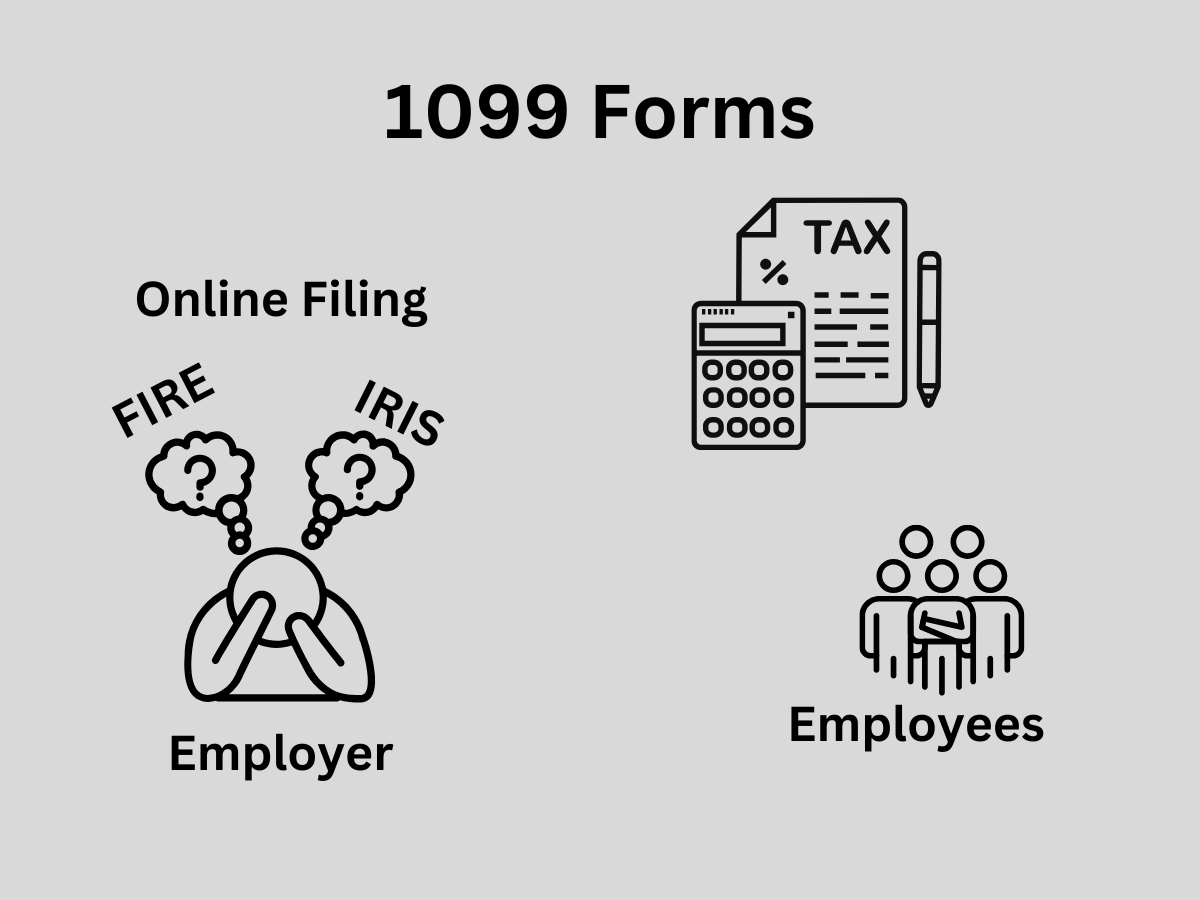
Filing 1099 Forms: Deadlines, Penalties & Tips
As we approach the end of the year, we want to take a moment to wish you a Merry Christmas and a Happy New Year! 🎄✨ Thank you for being part of this journey—we truly appreciate your trust and partnership. We are excited about all the possibilities the new year will bring for us all.
In preparation for the upcoming filing season, I also wanted to share some key information about filing 1099 forms, including important deadlines, updates to IRS systems, and steps for compliance. Whether you’re filing 1099-NEC, 1099-MISC, or both, this email includes helpful tips and resources to ensure you’re prepared.
It’s always a good idea to stay informed, so I’ve also included guidance on how to register for the IRS’s FIRE and IRIS systems, which you’ll need if you’re filing electronically. There’s also a quick summary of who should receive 1099 forms, filing responsibilities, and how to verify your information to avoid errors.
Please take a moment to review the information below. If you have any questions, feel free to reach out. I hope this makes the process smoother for you!
Filing Requirements for 10 or More 1099s
If your business issues 10 or more 1099 forms, including Form 1099-NEC (Nonemployee Compensation) and Form 1099-MISC (Miscellaneous Information), they must be transmitted to the IRS electronically. This rule, finalized by the IRS on February 21, 2023, applies to returns required to be filed on or after January 1, 2024, and continues for subsequent years, including filings for the 2024 tax year in 2025. The IRS plans to eventually replace the Filing Information Returns Electronically (FIRE) system with the Information Returns Intake System (IRIS). Both systems currently operate in parallel, but IRIS is expected to become the primary system for filing information returns.
FIRE Maintenance and Availability
The Filing Information Returns Electronically (FIRE) system undergoes annual maintenance, during which it is unavailable.
- Unavailable Period: November 22, 2024, at 3 p.m. Eastern Time to January 13, 2025
- Operational Period: January 13, 2025, until a date to be determined
IRS Systems Transition
The IRS plans to transition from FIRE to IRIS, which will simplify filing for many businesses.
- Key Details:
- Both systems require separate Transmitter Control Codes (TCCs) that are not interchangeable.
- IRIS is expected to become the primary filing system in the near future.
- To prepare, businesses are encouraged to register with IRIS.
- Learn More: https://www.irs.gov/filing/e-file-information-returns-with-iris
How to Register for FIRE and IRIS
Registration for FIRE
To use FIRE, businesses need to register and obtain a TCC.
- Required Information:
- Legal business name, Employer Identification Number (EIN), and address
- Contact details and names of authorized officials
- Types of forms you plan to file and estimated filing volume
- Register Here: https://www.irs.gov/e-file-providers/filing-information-returns-electronically-fire
Registration for IRIS
IRIS offers a simpler, free platform for small businesses.
- Required Information:
- Legal business name, EIN, and address
- Contact details and names of authorized officials
- Types of forms you plan to file and estimated filing volume
- Sign Up Here: https://www.irs.gov/filing/e-file-information-returns-with-iris
- Identity Verification:
- Both FIRE and IRIS require verification via ID.me.
- Allow at least 45 days for TCC application processing.
TCC Reuse and Maintenance
Once you have a TCC, it remains valid as long as:
- You File Regularly: File at least once every two years.
- You Keep Information Updated: Notify the IRS of any changes to your account details, such as address or contact information.
Failure to file or update information could result in deactivation of your TCC.
Important Deadlines
- Forms to Recipients: Both 1099-NEC and 1099-MISC must be sent to recipients by January 31.
- Filing with the IRS:
- 1099-NEC: Must be submitted by January 31, whether filed electronically or by mail.
- 1099-MISC: Must be submitted by January 31 if filing electronically. For paper submissions, check IRS guidelines.
Who Receives a 1099?
- 1099-NEC: For independent contractors or self-employed individuals earning $600 or more in nonemployee compensation. Examples include freelance work, consulting, and contract labor.
- 1099-MISC: For other payments, including:
- Rent exceeding $600
- Prizes and awards of $600 or more
- Attorney fees (even for incorporated attorneys)
- Healthcare payments
Can Someone Else File Your 1099s?
You can authorize a third party, such as a payroll service, accountant, or tax preparer, to file on your behalf.
- What to Provide:
- Accurate names, Taxpayer Identification Numbers (TINs), addresses, and payment amounts
- Who’s Responsible:
- While a third party handles filing, the employer is ultimately responsible for accuracy.
Who Is Responsible for the Information on 1099s?
Employers are accountable for the accuracy of the forms, even if filed by a third party.
- Steps for Compliance:
- Collect Form W-9s from contractors or vendors.
- Verify payment amounts and recipient details.
- Retain records for at least three years in case of audit.
Thank you for taking the time to review this email. We know staying on top of these requirements can feel overwhelming, but having the right information is half the battle. If you have any questions or need clarification, don’t hesitate to get in touch—we’re happy to help where we can.
Wishing you a smooth and successful filing season, and once again, a Merry Christmas and a Happy New Year! 🎄
Disclaimer
This information is provided for informational purposes only and should not be considered legal, financial, or tax advice. Rules and requirements may change. Business owners are responsible for verifying current IRS regulations. The provider assumes no liability for reliance on this content.

